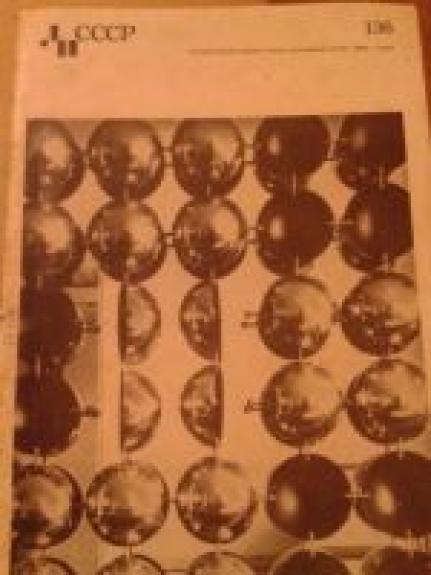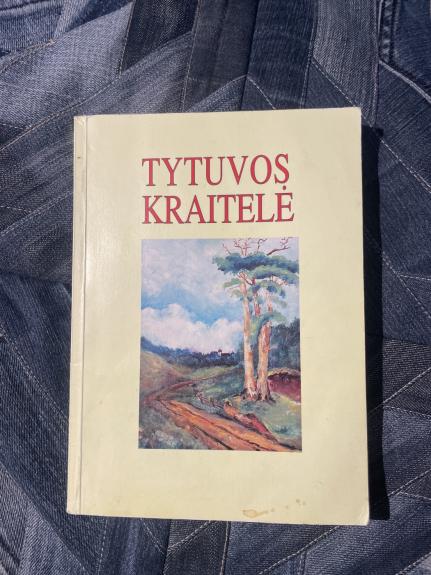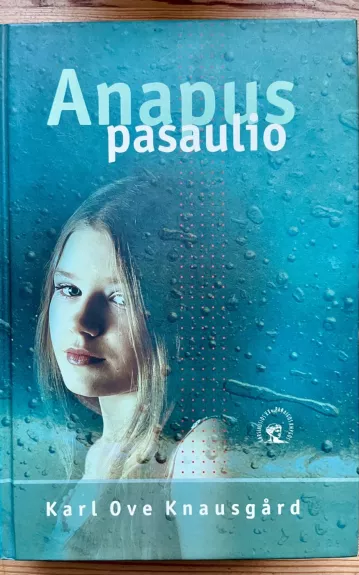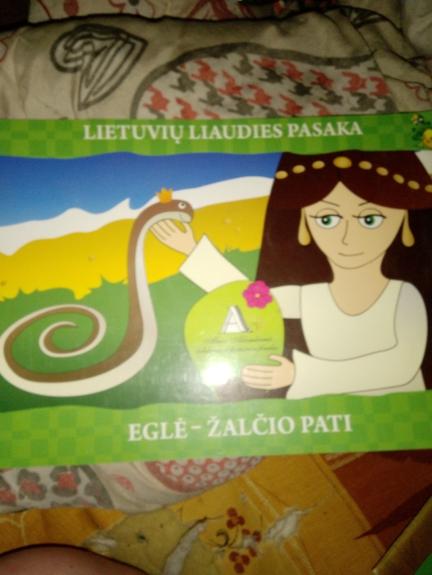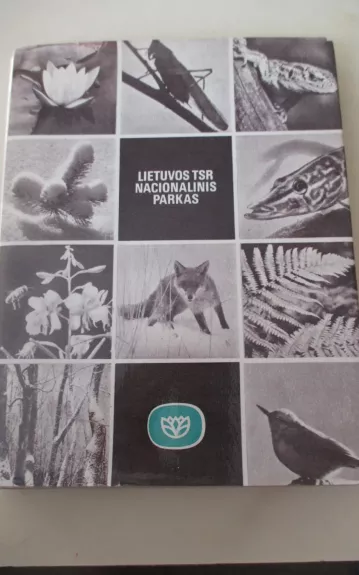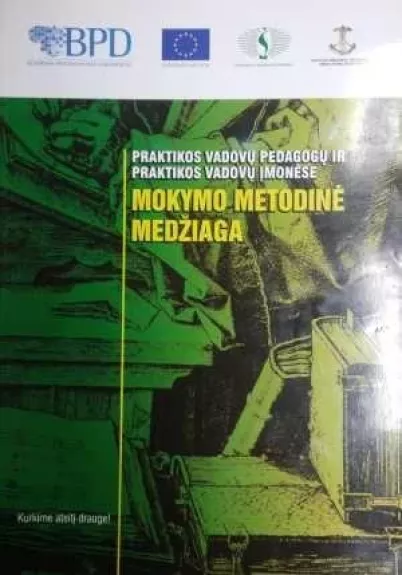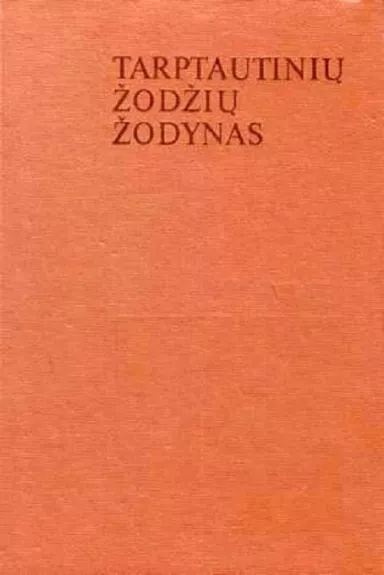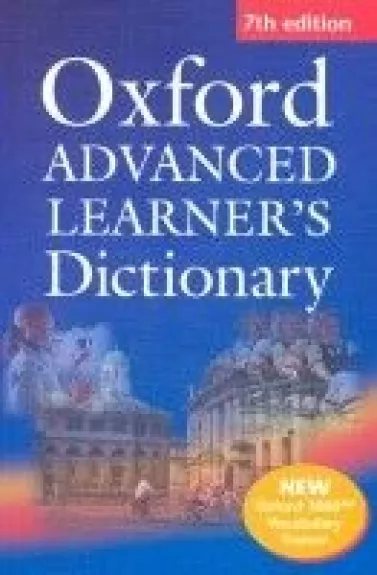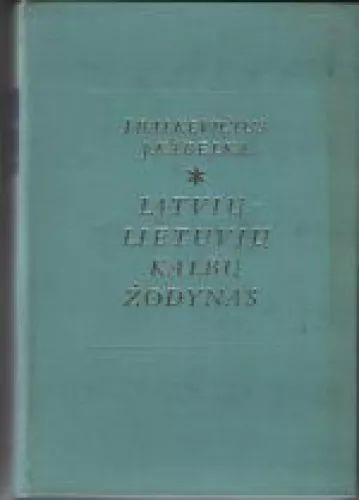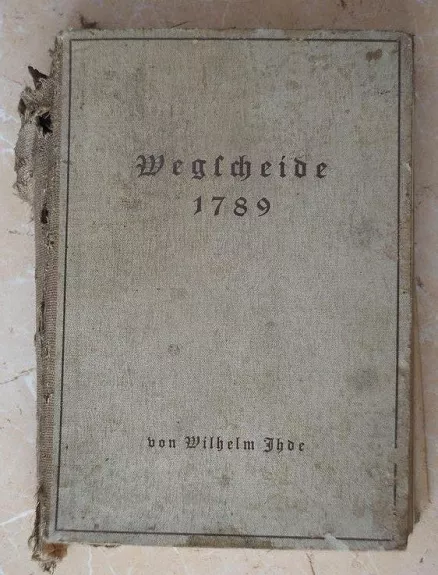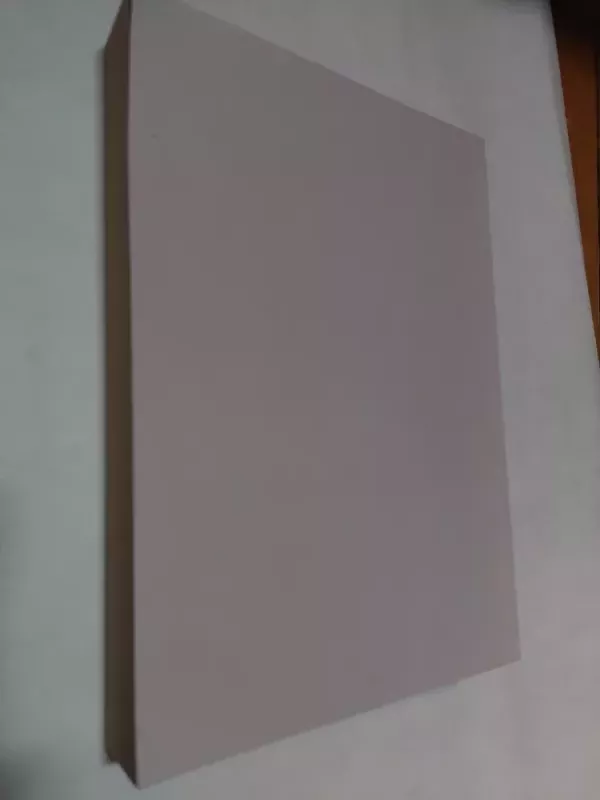
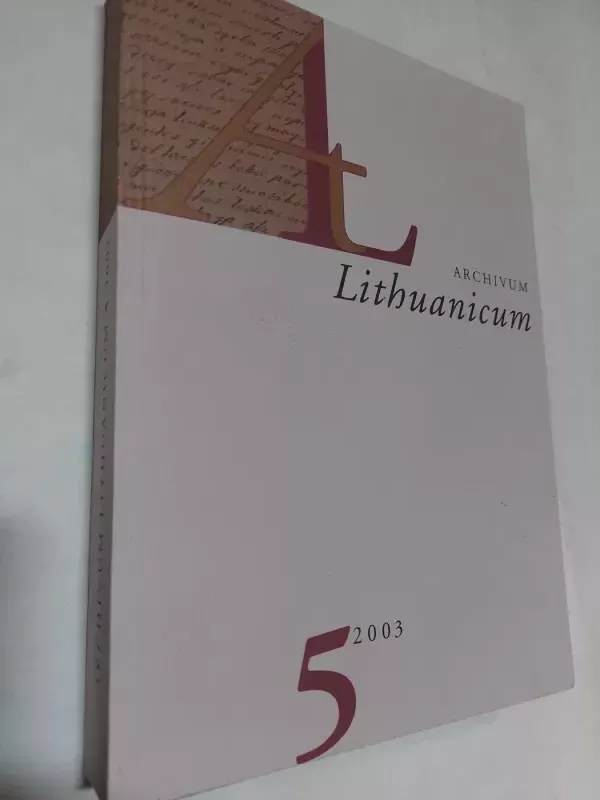
Archivum Lituanicum 5
Archivum Lithuanicum 5
2003 metais paskirta antroji Archivum Lithuanicum stipendija, kurios fundatorius - Robinas Neumannas iš Čikagos. Stipendija skiriama Lietuvos magistrui, magistrantui ar doktorantui, atliekančiam istorinės išorinės lingvistikos tyrimus.
Turinys (Contents)
Straipsniai (Articles)
Ona Aleknavičienė, Christiane Schiller
Jacobas Perkuhnas prieš Michaelą Mörliną, Johanną Schultzą
ir Philippą Ruhigą 15
Jolanta Gelumbeckaitė
Pirmas lietuviškas pamokslų rinkinys Wolfenbüttelio postilė (1573).
Rankraščio kritinio komentuoto leidimo principai ir tyrimo strategija 51
Žavinta Sidabraitė
Milkų šeimos vieta XVIII amžiaus Mažosios Lietuvos raštijoje 97
Vilma Zubaitienė
Kristijono Milkaus (1800) pakeitimai Pilypo Ruigio (1747) žodyne 127
Eglė Bukantytė
Naujojo Testamento citatos Jono Bretkûno Postilės (1591) pamoksluose 179
Pietro U. Dini
Dar kartą apie lietuvių romėniškosios kilmės
teoriją: lingvistinė valakiškojo varianto samprata 195
Kęstutis Gudmantas
Apie kai kurias 1510 metų Aleksandrijos
ir legendinės Lietuvos metraščių dalies sąsajas 207
Giedrius Subačius
XVIIIXIX amžiaus lietuviškų tekstų grafemos 227
Reda Griškaitė
Dominikas Cezarijus Chodzka Simono Daukanto kolega 263
Recenzijos (Reviews)
Friedrich Scholz (Hrsg.), Textkritische Edition der Übersetzung des Psalters in die Litauische Sprache von Johannes Bretke, 2003 (JOLANTA GELUMBECKAITĖ) 299
Jolanta Gelumbeckaitė, Linksnių ir prielinksnių sintaksė Jono Bretkūno Biblijos Evangelijoje pagal Luką, 2002 (JANINA ŠVAMBARYTĖ) 311
Mikas Vaicekauskas (par.), Egzodo Donelaitis. Lietuvių išeivių tekstai
apie Kristijoną Donelaitį, 2001 (DALIA DILYTĖ) 315
Leonas Gineitis (par.), Iš vokiškųjų raštų apie Kristijoną Donelaitį, 2002 (LIUCIJA CITAVIÈIÛTË) 325
Liucija Citavičiūtė (par.), Martynas Liudvikas Rėza,
Lietuvių kalbos seminaro istorija, 2003 (CHRISTIANE SCHILLER) 337
Christiane Schiller, Bilinguismus: zur Darstellung eines soziolinguistischen Phänomens in der Literatur, 2000 (SIGITA BARNIŠKIENĖ) 345
Vilija Gerulaitienė (par.), Keturi Gotfrydo Ostermejerio rankraščiai, 2002 (GERTRUD BENSE) 349
Zigmas Zinkevičius, Rinktiniai straipsniai 12, 2002 (BRONIUS MASKULIŪNAS) 355
Norbertas Vėlius (par.), Baltų religijos ir mitologijos šaltiniai 2. XVI amžius, 2001 (WILLIAM R. SCHMALSTIEG) 363
Konrad Schröder, Die skandinavischen und baltischen Sprachen sowie Jiddisch und Rotwelsch, 2001 (CHRISTIANE SCHILLER) 369
Erdvilas Jakulis, Lietuvių kalbos tekėti, teka tipo veiksmažodžiai ir jų istorija, Daktaro disertacija, 2002 (SAULIUS AMBRAZAS) 373
Alma Ragauskaitė, XVIXVIII a. kauniečių asmenvardžiai,
Daktaro disertacija, 2002 (SAULIUS AMBRAZAS) 377
Jovita Erichsmeier, Tikslo, sąlygos ir nuolaidos šalutiniai sakiniai XVIXVII a. Mažosios Lietuvos autorių raštuose, Daktaro disertacija, 2002 (ONA ALEKNAVIČIENĖ) 381
Diskusijos, apžvalgos, pastabos (Discussions, Surveys, Notes)
Jurgita Girčienė
Leksikos gryninimo polinkiai bendrinės lietuvių kalbos istorijoje 391
Janina Švambarytė
Jono Basanavičiaus lietuvių kalbos norminimo gairės 411
Jurgis Pakerys
Lietuvos kultūros istorija Hercogo Augusto bibliotekoje Wolfenbüttelyje: 2002 - 2003 metų renginiai 419
Roma Bončkutė
Dvi konferencijos: Motiejaus Valančiaus ir Antano Baranausko 423
Sauliaus Ambrazas
Kazimierui Jauniui skirta konferencija 429
Elvira-Julia Bukevičiūtė
Lietuviškai Biblijai 400 metų: tarptautinë mokslinë konferencija Greifswalde 435
Archivum Lithuanicum rengimo principai ir santrumpos 441
This year (2003) the second Archivum Lithuanicum scholarship was awarded to Šiauliai University doctoral student Robertas Gedrimas. This scholarship was established in 2002 by Mr. Robin Neumann of Chicago. It is awarded to a graduate student, either a masters or a doctoral student, engaged in research on the external history of some language. The current recipient, Robertas Gedrimas, is focusing his research mostly on the linguistic attitudes of Jurgis Ambraziejus Pabrėža (1771-1849) and on Pabrėža's derivational theory for new geographical, botanical, and other scientific terms. The first recipient of the Archivum Lithuanicum scholarship (2002) was Vilma Zubaitienė, who is publishing an article in this volume about the manner in which Kristijonas Gotlybas Milkus edited, corrected and enlarged (1800) a dictionary by Pilypas Ruigys (Lithuanian-German Dictionary, 1747), and about Milkus' attempts to improve the lexicographic method of Ruigys.
Briefly the contents of the fifth volume can be described in this way: linguistic discussions, dictionary editorship, lexical purism, the usage of some type-face characters, the origin of a language, archival data, sources of translations and chronicles, personal relationships of cultural activists, new dates, books, and conferences. Discussed in this volume are Antanas Baranauskas, Jonas Basanavičius, Jonas Bylaukis, Jonas Bretkûnas, Dominikas Cezarijus Chodzka, Simonas Daukantas, Kristijonas Donelaitis, Albertas Goštautas, Kazimieras Jaunius, Philipp Melanchthon, Kristijonas Gotlybas Milkus, Petras Gotlybas Milkus, Michael Mörlin, Gotfrydas Ostermejeris, Jokūbas Perkūnas, Kasparas Peuceris, Martynas Liudvikas Rėza, Pilypas Ruigys, Mykolas Sapūnas, Jonas Šulcas, Motiejus Valančius, Patroklas Velveris.
In the fifth volume of Archivum Lithuanicum topics on East Prussian (Lithuania Minor) texts and German Lithuanistic studies predominate again as in the fourth volume. Every year authors make important discoveries of unknown documents and sources, especially in the archives and libraries of Germany. For instance, last
year Ona Aleknavičienė and Christiane Schiller found and published a letter by Jonas Berentas (March 20, 1729); they also described a recently found copy (the second one) of the treatise Principium primarium in Lingva Lithvanica (1706) by Michael Mörlin. This year the same authors introduce one more discovery, a printed polemical treatise by Jokūbas Perkūnas that was directed against the prescriptive ideas of Mörlin (also against those of Jonas Šulcas, Pilypas Ruigys), and which was unknown to scholars since the eighteenth century. Žavinta Sidabraitė also publishes two so far unknown letters of Kristijonas Gotlybas Milkus (December 2, 1779; and March 26, 1800) and some new archival material about the Milkus (Mielcke) family. She corrects the birth date of the father
Petras Gotlybas (1693) and of his son Kristijonas Gotlybas (1733) and supplies their family biographies with new details. Discoveries may also be made in the archives and libraries of Lithuania. Reda Griškaitė tracked down two so far unknown (unidentified) letters of Simonas Daukantas (to Dominikas Cezarijus Chodzka [after 1844] and to Adomas Zavadzkis [October 28, 1844]). She proved that a member of the Vilnius intellectual elite, Chodzka, and the famous Lithuanian historian Daukantas had a close and even very friendly relationship, and that they had known each other ever since high
school days in Vilnius.
Jolanta Gelumbeckaitė and Eglė Bukantytė research texts that were created in East Prussia (Lithuania Minor) as well. Gelumbeckaitė presents and describes the principles of critical commentary of an edition and the strategy of research of the so-called Lithuanian Postilla of Wolfenbüttel (1573) that she is presently preparing for
publication in Germany: paper, ink, watermarks, pagination, binding, the nature of corrections and commentaries, particularities of transcription, correctors, dating, etc. (so far nobody has described these principles in Lithuania so elaborately while preparing a manuscript or an edition of a printed text). Bukantytė proves that when Jonas Bretkūnas was writing the first part of his Postilla (1591) he did not use earlier sources (not even his own translation of the New Testament, nor the Lithuanian Postilla of Wolfenbüttel [1573]). Bretkūnas translated Bible texts anew; he did not try
to repeat former Bible texts or establish a Lithuanian canonical text of the Bible.
Pietro U. Dini introduces reflections on the origin of the Baltic languages during the Renaissance period in Western Europe. According to the Valachian variant of the theory the Lithuanian and the Old Prussian languages are considered to be the result of a twice corrupted Latin language: the first corruption was produced by the Valachian language and the second corruption by the Baltic (Lithuanian and Old Prussian) languages.






